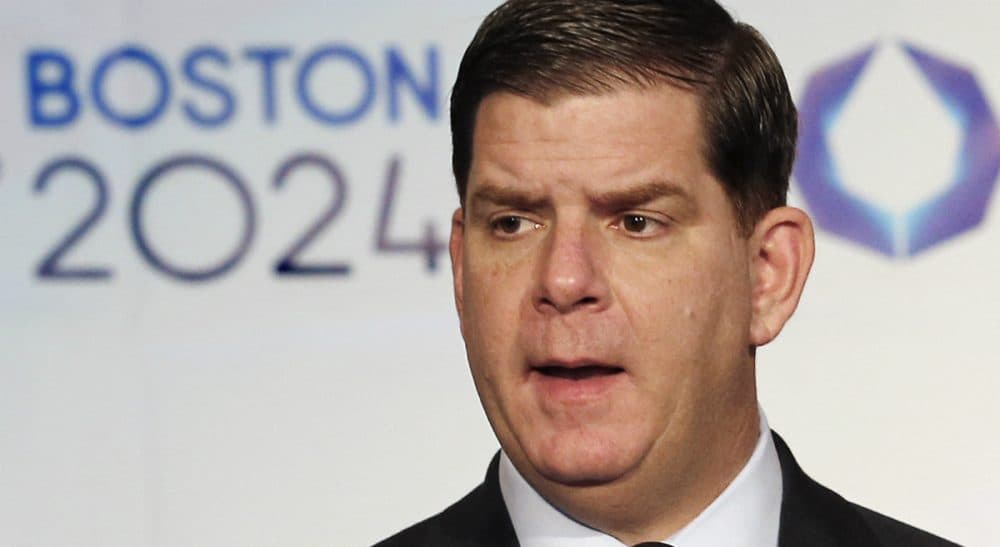Advertisement
Boston 2024 Free Speech Kerfuffle: Walsh's Explanation Worse Than Original Ban

"It was in the agreement and we had to get the agreement signed," explained Mayor Marty Walsh when confronted by The Boston Globe with one of the "Covenants of the City" contained in the "joinder agreement" between the city of Boston and the United States Olympic Committee.
The particularly noxious covenant in question promises that "The City, including its employees, officers and representatives" will not make any "comments or statements (written or oral)" that are negative about the Olympics and that all of the named people "shall each promote" the bid and the "Olympic and Paralympic movement in a positive manner." Thus, the mayor promised not only that none of the employees would denigrate the Olympics, but promised affirmatively that all of the named people would promote the Boston bid and the Olympics. Promising to control the speech of so many is no small matter.
The covenant at issue is offensive on a number of levels, but the mayor's dismissal of the significance of a contract that he executed on behalf of the city is stunning.
When asked about the words of the contract he signed, the mayor responded in political fashion. “I believe in free speech,” Walsh said. “I’ve believed in free speech my whole time. As a labor activist, I believed in free speech. As a state representative, I believed in free speech. And as mayor, I believe in free speech. If a city employee isn’t happy and on their own personal time goes to Facebook or Twitter or any other social media, that’s fine.” He sent a message to all city employees on Thursday telling them that they were free, on their own time, to express their own views about the Olympics. He wrote: "All employees are welcome to share their opinions as we move forward." This is a politic message; it is flatly contrary to the contract the mayor signed.
That contract nowhere suggests that allowing a city employee to express personal opposition to the Olympics would be "fine." Indeed, based just on reading the agreement, such conduct by a city employee would put the city in breach of this covenant. With contracts, it comes down to what the words say.
In an interview with the Globe, Sarah Wunsch of the American Civil Liberties Union of Massachusetts observes that this provision is likely unconstitutional because of the degree of restriction it purports to place on individual expression outside of the workplace. There is room for debate about that — but that's not the point of this piece. My interest is in the mayor's response: "We had to get the agreement signed" is something lawyers are used to hearing from clients who are suddenly confronted with the implications of a contract that they signed when things seemed rosy.
This notion of a legal promise being "boilerplate" and thus somehow less binding than other legal obligations is without legal foundation. It is, nevertheless, deep enough in our collective consciousness for the mayor to offer it by way of explanation of a commitment he knows he cannot justify. Employees looking to switch jobs will often dismiss promises not to compete with an employer in similar fashion — "they told me I had to sign it if I wanted to work there" or "I never thought I'd want another job" or "it's boilerplate — everyone had to sign it." None of these arguments has resonance with courts. That we don't, in hindsight, like something we agreed to do does not erase the meaning of our earlier, binding promise.
Here's some other language from the joinder agreement: "the parties hereby intending to be legally bound agree as follows," and, just above the mayor's signature, "each of the parties has caused this Agreement to be duly executed on its behalf as of the day and year first above written." This is the language of contract. It means that the words themselves reflect legal obligation. It means that the parties (our city included) intend to honor the commitments contained in the document. The document has legal force — it is not just a means to an end. Indeed, we use language like this in contracts to distinguish them from other deals we make, by handshake or otherwise. We do it to signal to each other and the world (including the courts) that we are prepared to be held accountable for what the document says we will do.
The covenant at issue is offensive on a number of levels, but the mayor's dismissal of the significance of a contract that he executed on behalf of the city is stunning. Every day the city enters into agreements on a number of subjects and promises that it will do certain things. In exchange, and in reliance, businesses and people make similar promises to the city. The notion that the mayor regards contracting as a means to an end ("we had to get the agreement signed") and that some of the promises contained in contracts can be dismissed as "boilerplate" and thereby treated as meaningless is deeply unsettling.
Contracts can be negotiated — the mayor could have, and should have, insisted on changes to the covenant relating to employee speech before signing the agreement. Instead, he signed it and has now says loudly that he will not limit employee speech. Even if it is the right result, his route to it is disturbing at best.
